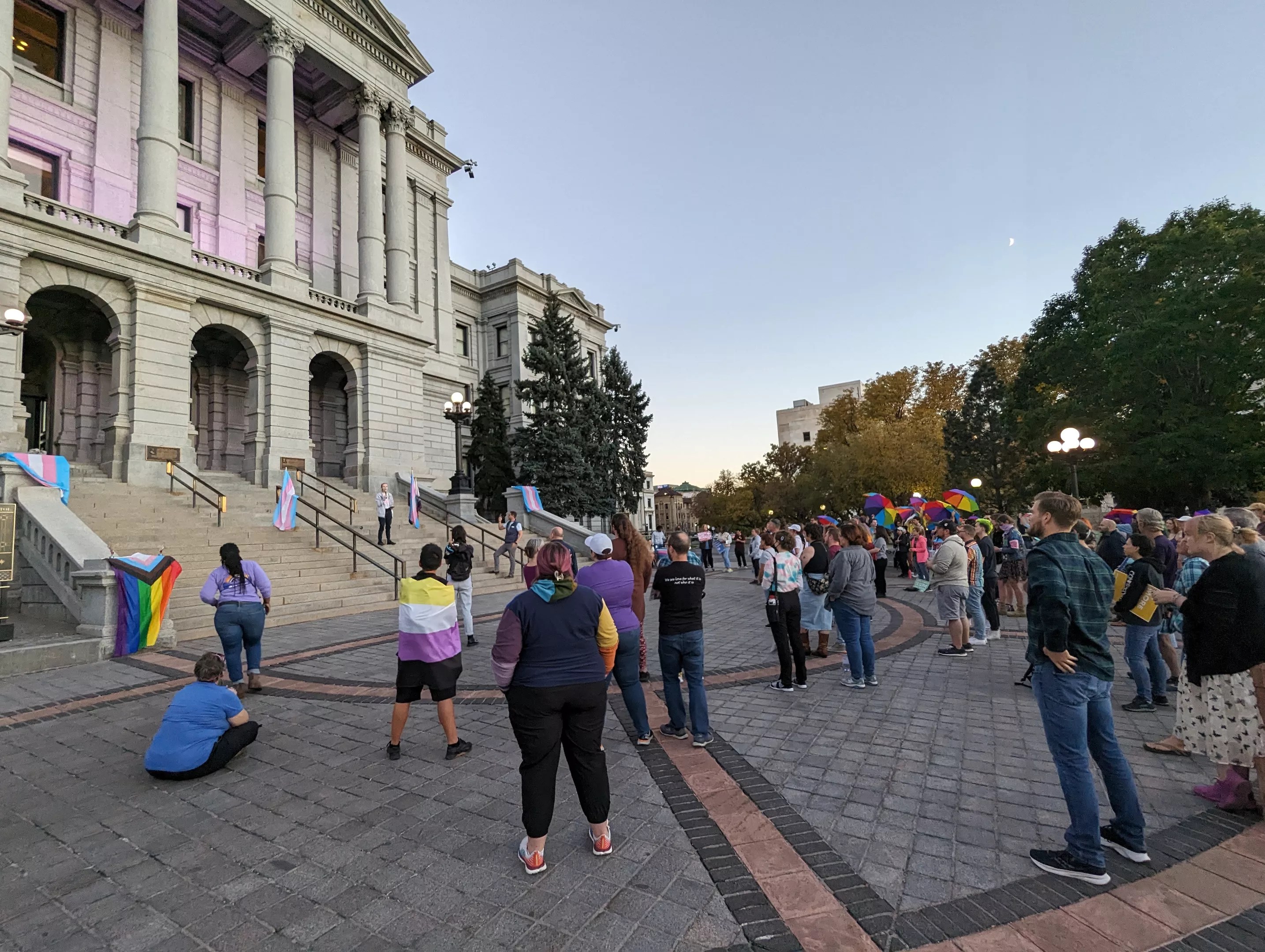
Hannah Metzger

Audio By Carbonatix
The ability to require respectful speech during legislative hearings is the target of a new lawsuit after two speakers were cut off for intentionally and repeatedly misgendering transgender individuals.
Christina Goeke and Rich Guggenheim are suing five state legislators for interrupting their testimonies on House Bill 1071, legislation that would let felons request name changes to conform with their gender identity. While testifying, Goeke and Guggenheim referred to the transgender woman who inspired the bill, Tiara Latrice Kelley, as a man and used her former male name, a practice known as “deadnaming” in the transgender community.
“There is no such thing as trans! This is a mental problem!” Goeke yelled during the committee hearing on January 30 after her testimony was disrupted for ignoring instructions to speak about the bill and not to misgender Kelley. “You’re all a bunch of cowards! You know that sex is real and gender is nothing!”
“What we will not allow…is failing to treat one another with dignity and respect,” Senator Julie Gonzales said during a March 27 committee hearing where Goeke also testified on the bill to similar effect. “We can disagree, that’s fine, I welcome it, it’s what we do here within this building. But we will not treat each other with a lack of decorum and a lack of respect.”
Legislators repeatedly warned Goeke and Guggenheim to stop misgendering Kelley and gave them multiple opportunities to continue their testimonies before eventually cutting off their remarks. Before the testimonies began, legislators announced that misgendering and deadnaming people would violate the committee hearings’ rules of decorum, which required respectful speech and prohibited derogatory language.
The lawsuit argues that these guidelines violate freedom-of-speech protections, saying it is “compelled speech” to make speakers refer to an individual using certain names or pronouns.
“Americans are having a debate about sex, gender and pronouns. The First Amendment protects Americans’ right to express their views on those matters, even if those views might be offensive to some,” said Del Kolde, a senior attorney at the Institute for Free Speech, the organization behind the lawsuit, in a statement. “By forcing speakers to adopt a contested ideology, Colorado lawmakers unlawfully privileged one viewpoint over another and silenced dissent.”
The lawsuit asks the court to prohibit legislators from requiring “respectful” speech during public testimony and from restricting testimony for featuring derogatory or disparaging language about individuals, including misgendering and deadnaming.
The lawsuit was filed in U.S. District Court on April 4 and also features Goeke’s and Guggenheim’s organizations, Rocky Mountain Women’s Network and Gays Against Groomers, as plaintiffs.
The five Democratic legislators named as defendants in the lawsuit are representatives Lorena Garcia, Mike Weissman and Leslie Herod, and senators Gonzales and Dafna Michaelson Jenet. Garcia and Michaelson Jenet are sponsors of House Bill 1071, Weissman and Gonzales are chairs of the committees in which the plaintiffs testified, and Herod is a committee member who asked the chair to enforce the rules of decorum.
The legislators told Westword they would not comment on the lawsuit until they retain counsel.
Chilling Speech
LGBTQ advocates say the lawsuit threatens to turn the State Capitol into an unsafe place for transgender people to participate in government. A ruling in favor of the plaintiffs, they argue, would mean transgender Coloradans risk the emotional and psychological harm of being misgendered for simply trying to engage in policy debates.
Kelley was present during the committee hearings to provide her own testimony while she was repeatedly misgendered and deadnamed by Goeke and Guggenheim.
“If transgender folks or nonbinary folks are in a room and their identities are being deliberately disrespected in this way, it silences their voices to speak on important issues like this,” says Garrett Royer, deputy director of the LGBTQ advocacy group One Colorado. “It erases a community that is already vulnerable in so many ways. By silencing those voices, you do even more damage to the community.”
The lawsuit claims that it is Goeke and Guggenheim who are being silenced, saying the pair plan to “self-censor” and refrain from participating in the legislature’s public-comment sessions if the court does not prohibit rules of respect during testimony. Guggenheim says he dropped out of testifying during the January 30 hearing after he learned he wasn’t allowed to misgender or deadname people.
“[Guggenheim and Goeke] consider adherence to a transgender person’s pronoun preferences, assumed gender, or assumed name to be a form of lying and…consider pronoun rituals, and the concepts of deadnaming and misgendering to be degrading and demeaning to themselves,” the lawsuit reads.
Royer says using a transgender person’s preferred name and pronouns is no different from using a cisgender person’s nickname or calling legislators by their “representative,” “senator” or “chair” titles during the committee hearings.
“We respect all of those choices. This shouldn’t be seen as anything separate from that,” Royer says. “Transgender and nonbinary people deserve the same respect and dignity as everybody else.”

The lawsuit stems from a bill to let people convicted of a felony request name changes to conform with their gender identity.
One Colorado
Committee chairs have the authority to limit testimony and to ask for a witness to be removed if they are being disruptive, according to this year’s public participation memorandum. General legislative rules prohibit behaviors like cheering and booing during public hearings, but chairs are also permitted to establish decorum rules for meetings. “Witnesses who fail to follow the rules…forfeit their opportunity to testify,” a 2023 policy states.
During the committee hearings mentioned in the lawsuit, the chairs adopted rules requiring respectful speech and prohibiting derogatory language. They specified that misgendering and deadnaming would violate these rules.
Legislative leadership has set a precedent for respecting preferred names and pronouns this session, specifically regarding House Bill 1071.
“As we speak about Tiara [Latrice Kelley], we will provide Tiara with respect and continue to use her name, as that is integral and a part of her identity,” House Speaker Julie McCluskie said during the floor debate on the bill on February 26. “Not to use her name or to refer to her as anyone else is disrespectful and will not be allowed in this chamber.”
At one point, Republican Representative Scott Bottoms referred to Kelley by her deadname and was immediately asked to leave the well by McCluskie. Bottoms has a history of making anti-LGBTQ remarks on the floor, including saying being transgender is “[lying] to yourself.”
Other instances of misgendering have occurred in the Capitol. Just last month, Republican Representative Ken DeGraaf misgendered Colorado’s only transgender legislator, Democratic Representative Brianna Titone, calling her “Mister Chair” instead of “Madam Chair” on the House floor. Titone corrected DeGraaf and allowed him to continue his remarks, though DeGraaf did not rectify his statement or acknowledge Titone’s correction.
Committee Testimonies
In the first committee hearing mentioned in the lawsuit, Goeke spoke about how activists call House Bill 1071 “Tiara’s Law” after Kelley, referring to her as “him” to boos from the crowd of other members of the public waiting to testify.
“Misgendering is not a crime!” Goeke then shouted during the meeting on January 30. “You know what? I’m correctly sexing, correctly sexing. Sex matters, gender is nothing, it means nothing.”
After some back-and-forth with Chair Weissman and an interjection from Representative Herod, Weissman called the committee into recess. A video posted to social media shows Goeke then yelling at the legislators that she “let [other speakers] spew their bullshit about gender,” at which point a sergeant asked her to leave and she began shouting “There is no such thing as trans!” and calling the legislators “cowards.”
During the second committee hearing on March 27, Goeke gave a similar testimony, deadnaming Kelley and saying she “appropriate[d] a female name to impersonate women,” leading Chair Gonzales to cut her off. Goeke spent the remainder of her time arguing with Gonzales about “infringing on my free speech” and being gaveled each time she misgendered Kelley.
Two minutes of audio from Goeke’s March 27 testimony after she was first gaveled is missing from the legislature’s record, which the lawsuit claims was intentionally erased “in an Orwellian fashion.” Her full testimony is provided in the lawsuit via a different audio recording.
Guggenheim also testified during the second meeting, deadnaming the transgender pioneers and activists Marsha P. Johnson and Sylvia Rivera. After a warning from Gonzales, Guggenheim then called Kelley a man, at which point Gonzales gaveled and ended his testimony.
Though Kelley was the subject of repeated insults and misgendering during testimony on House Bill 1071, she isn’t even officially affiliated with the bill. An amendment seeking to name the bill after her failed on February 26 in a 31-28 vote.
Kelley, a Colorado Springs resident, transitioned 27 years ago. But ten years after her transition, she got a felony charge converted from a series of sex-work-related misdemeanors in Florida, she says.
Colorado currently requires people convicted of a felony to show good cause before a judge to change their legal name. While Kelley was able to change her last name after she got married under these regulations, she hasn’t been able to change her first name to align with the gender identity she’s held for decades. This has led to issues including Kelley, a producer at Club Q, being unable to access victim support after the mass shooting, she claims.
House Bill 1071 would add conforming with an individual’s gender identity to the definition of good cause for requesting a name change.
“These are basic things like cashing checks, paying bills and going into a doctor’s office and having your name called without having to be embarrassed by a previous name that you don’t even recognize anymore,” Kelley said while testifying in support of the bill on January 30.
“We just want to be able to have a name on our identification card that matches who we are, so we don’t have to continuously be reminded of the person that we never felt comfortable with in the first place.”
Legislators passed House Bill 1071 in a 23-12 vote in the Senate and a 43-18 vote in the House. It now moves to the governor’s desk.
The legislature passed another name-change bill this session: House Bill 1039 would help students change their names in schools by declaring that a person’s non-legal chosen name falls within the legal discrimination protections of gender identity. That bill is also awaiting final approval from the governor.
A different bill to study the availability of gender-affirming health care in Colorado failed in its first committee vote on April 2. A measure to add gender identity and expression to the classes included in bias-motivated crimes passed the Senate but is still awaiting consideration from the House.